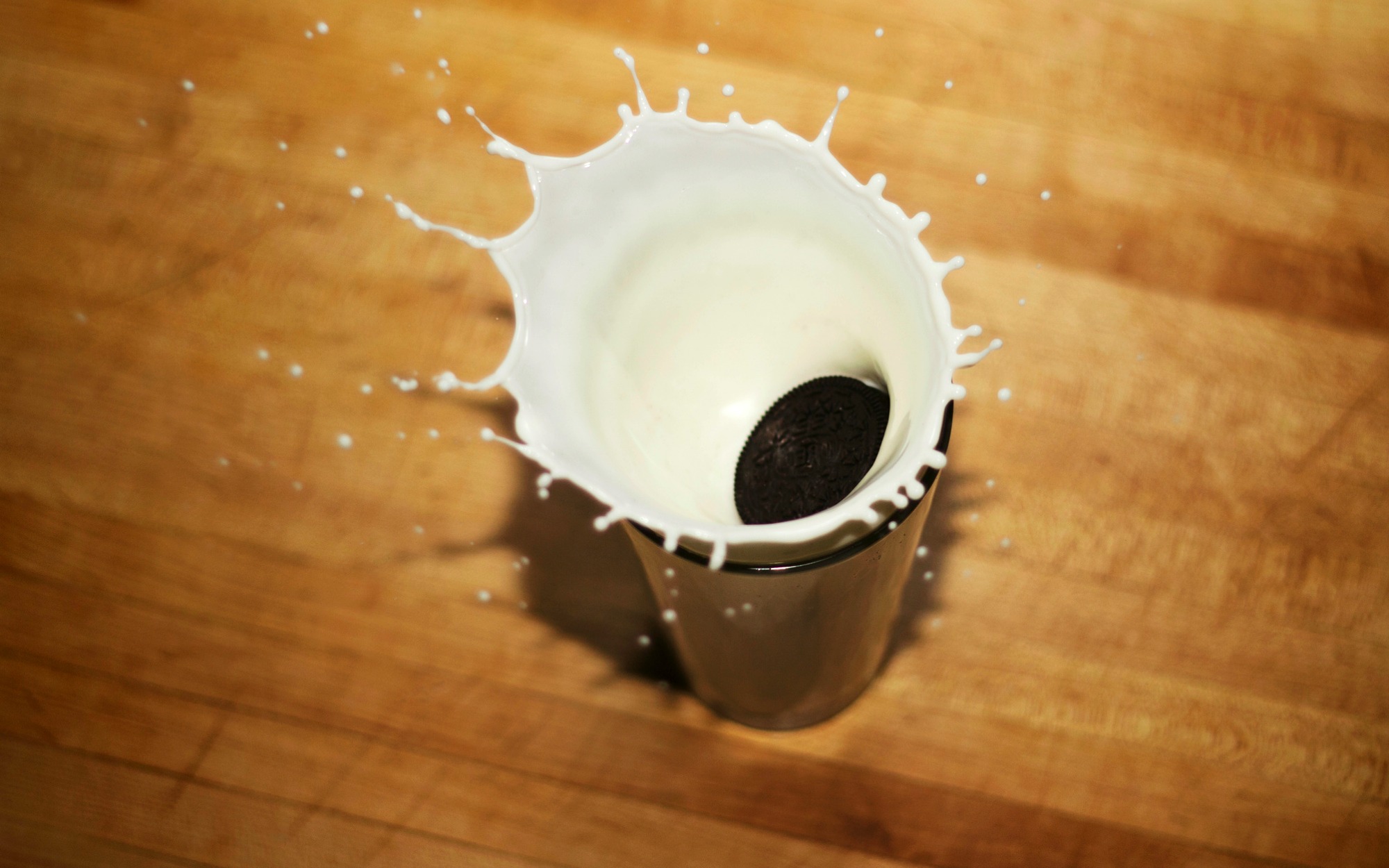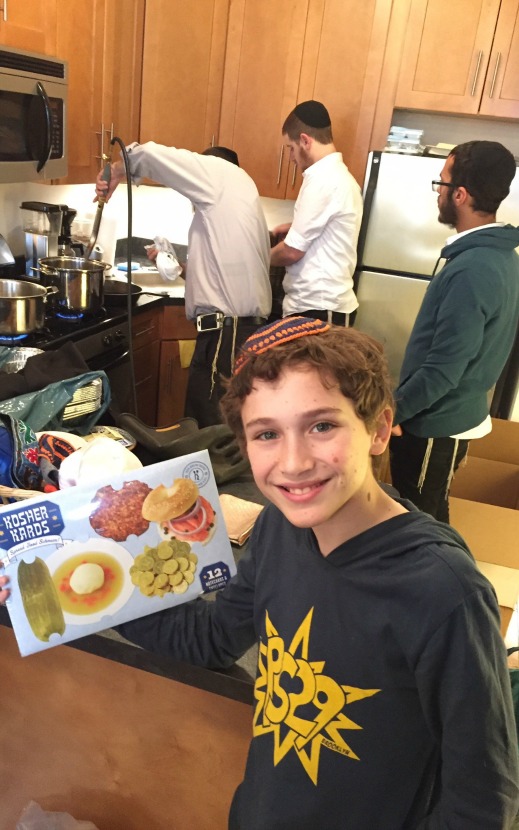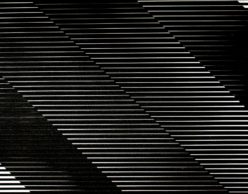Shalom, Kosher Kitchen

Mash-up families come in many forms: Black and white, Queer and adoptive, Hindu and Buddhist. But sometimes the mash-up is about how much of something each person is, and if that is enough. How Black are you? Is your partner more Black? How Hindu? Does it matter how much of something you are, if you are? Maybe. Our Jewish-American-Princess Mash-Up Lauren Young [Editor’s note: She calls herself a princess. We consider her a queen.] shares with us the challenges, and joys, of keeping a kosher kitchen as part of her relationship between Jewish and More Jewish.
This is a story about Mash-Up Marriage. It’s a story about using a blowtorch to make your utensils kosher. It’s also a story about love.
I am a butcher’s daughter.
As a child, I used to pretend I was Rocky and “box” hunks of beef in the meat locker at my dad’s butcher shop in Philadelphia. It was a family business, started by my grandfather’s brothers in 1922. The slogan: Where Philly Meats.
And while my family is Jewish, the butcher shop was far from kosher. The clientele was a melting pot of city workers, restaurateurs, Society Hill socialites and old-school Italian grandmothers.
Today I am a non-kosher butcher’s daughter, living in a kosher home. This is nearly impossible for even me to believe, but more on that later.
A quick primer on what is kosher and what is not: Kosher, literally translated, means suitable or “pure.” Kosher meat comes from cattle and game that have cloven hooves and “chew the cud.” Under the laws of Torah, these animals are slaughtered in a more humane way, slit at the neck, for quick death (although vegetarians are likely to challenge that belief).
[quote float=”left”]Goodbye, cheeseburgers. Goodbye, cheeseburgers with milkshakes.[/quote]
Kosher living includes a lot of governing principles: You do not combine milk and meat. (Goodbye, cheeseburgers. Goodbye, cheeseburgers with milkshakes.) If you eat meat at a meal, you cannot have dairy for a lengthy period of time afterward — as much as six hours, depending on your level of observance. You should keep separate dishes for milk meals and meat meals, too. Everyone knows that bacon is not kosher, but, aside from pork, plenty of other very tasty things are on the Jewish no-fly food zone, including shellfish, lobster, scallops, shrimp and eel. Also out: Fish without scales or bottom-feeders like catfish. This really limits your sushi selections.
Food that is not kosher is commonly referred to as treif (which means “torn”). I have firmly dwelled in the treif world for decades. I grew up on Philly cheesesteaks, Bookbinder’s shrimp cocktails, Canadian ham and Joe’s Stone Crabs. In college, I would go to my dad’s store before the semester started and fill up a large cooler with steaks, pork chops and chicken breasts to stock my freezer. Inevitably, my prankster father would wrap up a “surprise” in brown paper, one marked: “For Lauren Only.” It was usually a pig’s foot or some other disgusting treif body part.
To this day, I collect pigs in the form of trays, banks, figurines, plates and other swine memorabilia. My most favorite pig is dressed as a chef who stands about three feet high. He has a menu board, which I love to use for all special meals, but especially now for Shabbat dinner.

I met Jonathan on JDate, a Jewish dating site. He had checked off the box “Conservadox” (high on the observant scale) while I had ticked “Reform,” which is pretty low on the Jewish totem pole. Within the first hour of our very first date at a South African wine bar, he popped the question: “If this were to go any further, would you be willing to keep a kosher kitchen?”
My reply was stealth and smart.
“Absolutely, as long as I have two sinks and two dishwashers,” I quickly said. Subtext: Dude, if I’m keeping a kosher kitchen, it better be a really nice kitchen.
Flash forward nearly four years. The relationship has gone further: He asked the other question, and now Jonathan and I are engaged.
So, when we moved in together in January, combining children from previous marriages, sheets, towels, furniture, art and a whole slew of dishes, pots, pans and utensils — it was all under the keeping-it-kosher eyes of a rabbi.
Shalom, kosher kitchen.
[quote float=”left”][/quote]
I will not lie. I have been dreading a kosher kitchen ever since I fell in love with Jonathan. I am not a fan of rules. In fact, I break them all the time, though I do know what it is like to live with food rules. I once stopped eating pork for about five years in my early 30s, prompted by my grandmother, who alleged during breakfast one morning that a piece of bacon never touched her lips. Jewish guilt is a powerful thing.
Right before the big move, my son and I went on a treif bender. I made my stellar spicy crab pasta and cumin shrimp. I simmered meatballs with milk, breadcrumbs and parmesan cheese. We gorged on dozens of California rolls from our favorite sushi restaurant. Even fake crab doesn’t pass the kosher hurdle. My boy inhaled chicken and apple sausage with buttered cinnamon naan at breakfast.
And then it was over. Like Moses, I had wandered through the treif desert for more than 40 years, to finally enter the Promise-d land (of margarine, which is neither meat nor dairy — just gross.)
Figuring out how to make my kitchen kosher was not an easy task. I reached out to the rabbis at my Brooklyn synagogue for guidance. And then I called a few more rabbis from various Chabads around the city for their opinions. What I learned: You can DIY a kosher kitchen with lots of boiling water, but it requires a ton of work, in addition to giant aluminum pans. And I wanted my kosher kitchen to be, well, kosher. So I ended up hiring 888-GOKOSHER. Yes, this actually exists.
The rabbi showed up 90 minutes late and very apologetic, with two rabbinical students from Israel in tow, neither of whom spoke very much English. He went through all of my giant boxes of kitchenware. The amount of kitchen stuff I have accumulated since I moved to New York 23 years ago is astounding: Dozens of mixing bowls (glass and metal), fancy pottery, ramekins, measuring spoons, wooden cutting boards, a mixer, Le Creuset pots and knives.

I have prepared decades of non-kosher food in those dishes, which is why I honestly thought most of my stuff would not be eligible for the koshering process. Much to my surprise, the rabbi only made me toss out one wooden spoon — my favorite one of course, the one I used for browning meat — two baking pans and a wooden cutting board that was already cracking. (I had previously dug through the boxes and cast aside a very cute set of red lobster crackers.)
The process of koshering pots and pans involves high heat and lots of boiling water. First the rabbi blasted my pots and pans with a blowtorch. He submerged much of my cutlery in giant vats of steaming water. And then he disappeared for a few hours, taking all of my silverware and glassware in massive blue Tupperware bins to a mikveh, which is a ritual rainwater bath. When he returned, he proceeded to iron my kitchen counters and blast the oven with a blowtorch.
Hours of therapy have been spent discussing this giant kosher clusterfuck.
Hours of therapy have been spent discussing this giant kosher clusterfuck. My shrink told me if I want to stop being resentful, I need to pretend I’m traveling to a foreign country and just embrace the experience. There are things I truly hate about keeping a kosher kitchen, mostly that I’m constantly toggling between a dairy existence (breakfast dishes) and a meat existence (tomorrow’s dinner, or my son’s school lunch). Our apartment only has one sink, and one tiny dishwasher, which is running on a constant basis. It is running right now as I write this, in fact.
The other big challenge is the food itself. I am a food person. I express myself and my love through food. I collect cookbooks. I honestly enjoy shopping for food. My favorite thing to do when I’m traveling, in fact, is to go to the supermarket.
I am known for my brisket, chili and lamb chops. Being kosher means having to rethink all of my go-to recipes and side dishes. Chili can no longer be served with cheese, and forget about those fudgy Ghiradelli brownies for dessert. A rack of lamb, which used to cost about $20 at Costco, is now $75 from a kosher butcher, so those delicious lamb chops have been moved into the super-special meal category.
Kosher meat is salty and tough. And getting it has proved to be a huge challenge, even though we live in New York City, which has one of the largest Jewish populations in the world. Trader Joe’s has a small and basic selection of kosher meat — chicken parts, ground beef and brisket. But it is a giant production if I want to serve something special for Shabbat dinner like veal chops, since there are no kosher butcher shops in our neighborhood. We have tried several butchers so far, and my fiance gets the meat delivered to his office as a workaround.
So why do Jews go to such extremes? Some people think it was originally for health reasons — in the Old Country, pigs spread trichinosis. Many modern Jews, though, think that the laws of kashrut are simply primitive health regulations, now obsolete with the trappings of modern life like refrigeration.
My friends at Go Kosher have a more spiritual argument: “Keeping Kosher keeps us focused on our specific mission as the Jewish People; bringing G-d into every area of our lives making all our mundane activities holy, the culmination of which will result in the final redemption.”
Sure. But do I feel closer to God? No. Do I feel healthier? Nope. The stress of trying to get the right stuff to put on the table for my family is exhausting. And I’m definitely not saving any money. I do see Orthodox Jews on the street and subway, and think: “Hey, we have something in common!” But that’s about it.
So why am I doing this? Let’s be clear, in case I wasn’t already. I freaking hate keeping a kosher kitchen. I yell and stew a lot about our kitchen situation. I threatened my fiance (mockingly) with a butcher knife recently. My son’s nanny is our peacekeeper. The truth is, living together and combining households, kids, and the entirety of our adult lives is stressful enough already. The food thing is rubbing Morton’s kosher salt on the entire experience. Therapy has helped immeasurably, though my therapist keeps telling me I need to stop reminding him that we don’t have two sinks and two dishwashers yet.
But I also love Jonathan. He is the kindest, sweetest and most loving man I’ve ever met. And in our Mash-Up marriage of Jewish and more Jewish, this is part of the deal.
So while I do not feel more fulfilled as a Jew, and sometimes I just wish we could order in some freaking pad thai with chicken for dinner, I can say that I do feel I have a moral, and marital, obligation to see our kosher kitchen through. First and foremost, I am doing it for Jonathan’s mother, Sassi, who died when he was in his 20s. A German-Israeli immigrant, she proudly kept a kosher home. She was a legendary cook, and “everyone wanted to be at her Shabbos table,” Jonathan told me early in our relationship. And I feel equally responsible to his siblings, who also keep kosher homes, and to my future stepsons, who currently attend a Jewish day school.
Interestingly enough, my son, who grew up very secular environment, told me last week that there is a 50/50 percent chance he will keep a kosher home when he grows up. “It links me to my heritage,” he says.
Many people have asked me if I cheat. I have done some very, very bad things in my life, but I could not lie about being kosher. I cannot slip a meat fork into the sink filled with dairy dishes, as much as I really want to at this very minute.
But I do screw up. I have used wrong spoon several times. Today I fried an egg with butter in a meat pan. If I lived in a more observant neighborhood, I could take the pots to a local mikvah and dip them in rainwater, which would make them pure again. Instead, I got creative and koshered a bunch of flatware in the snow after a giant blizzard this winter. I don’t have a backyard to bury anything in, but you can always boil some water in a pinch.
One thing I have learned in my brief kosher experience is that while we all strive for perfection, there is room to make some mistakes. Such is life in the kitchen, and in love.
But don’t tell that to my fiancé: I am still waiting for those two sinks and dishwashers.
Think Mash-Up marriage is awesome and tricky? You are not alone.
Mazel Tov! You’re Engaged! But Your Fiance Isn’t [Insert Race/Religion/Ethnicity Here]
Top 12 Tips for Being an Indian Daughter-in-Law





